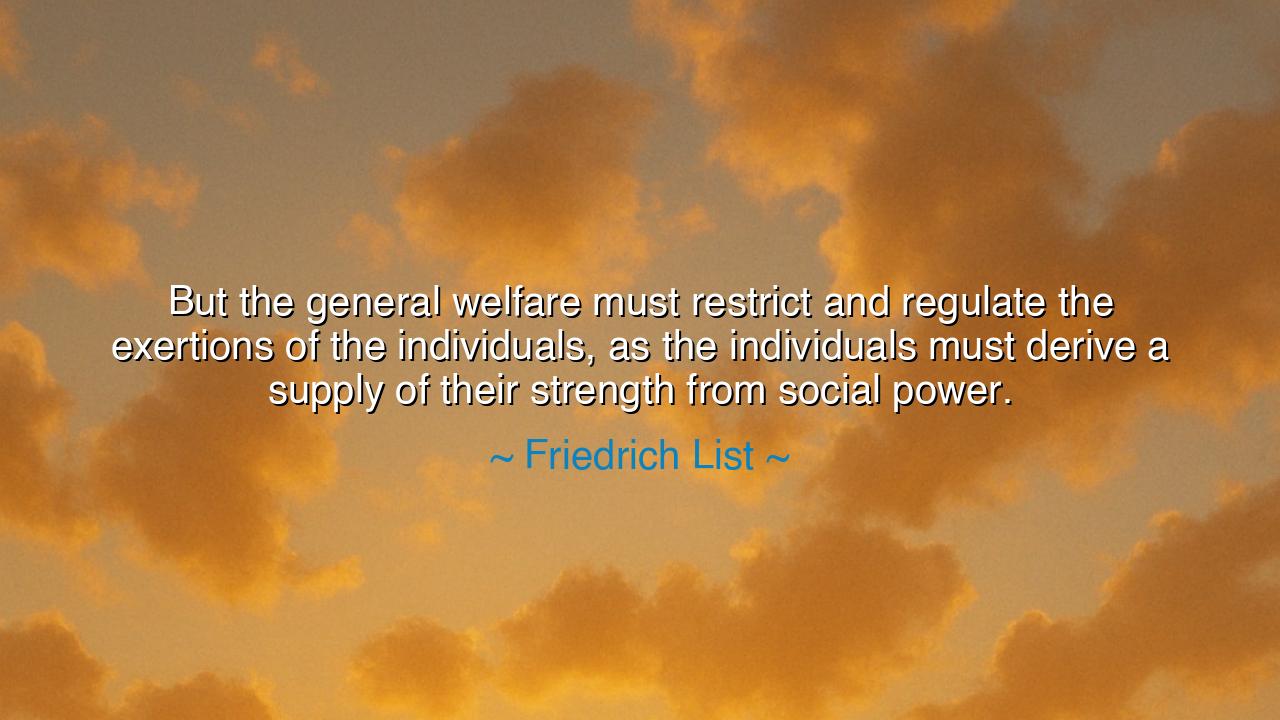
But the general welfare must restrict and regulate the exertions
But the general welfare must restrict and regulate the exertions of the individuals, as the individuals must derive a supply of their strength from social power.






Hearken, O children of distant generations, and attend to the words of Friedrich List, a sage of economics and society, whose vision reaches beyond the mere counting of coins and trade. He speaks of the delicate balance between the individual and the collective, reminding us that no solitary effort, however bold or vigorous, exists apart from the social power that nurtures it. The general welfare—the invisible web of law, custom, and communal strength—must temper the exertions of individuals, even as those same individuals draw strength from the society that surrounds them. In this, List captures a truth eternal: that human endeavor flourishes not in isolation, but in concert with the common good.
The origin of this wisdom lies in the turbulent age in which List wrote, the early 19th century, a time when nations wrestled with the forces of industrialization, commerce, and the newfound reach of global markets. He observed that unfettered individual action—though celebrated by some philosophers—could lead to fragmentation, inequality, and weakness. Just as the mighty oak cannot grow without the support of soil, water, and sun, so too can the strength of an individual only flourish within the nurturing framework of society, guided by shared norms, protections, and resources.
List’s insight recalls the ancient polis, where citizens were expected to contribute to the welfare of the city-state, even as they drew sustenance, security, and opportunity from it. In Athens, the strength of the citizen was inseparable from the strength of the polis: warriors, artisans, and merchants alike were restrained by law and duty, yet empowered by the collective life of the city. Their individual exertions were measured and directed not solely for personal gain, but for the enduring power of the community. So too does List argue that societal regulation is not a constraint, but a channel through which individual energy becomes truly potent.
History offers vivid examples. Consider the rise of the United States during its early industrial expansion. Entrepreneurs and inventors pursued personal ambition with vigor, yet their successes depended upon infrastructure, law, education, and civic order—manifestations of the general welfare. The Erie Canal, built through collective effort and public investment, magnified the impact of individual labor, turning isolated exertions into a flood of national productivity. Here, List’s principle is revealed: individuals derive strength and opportunity from the social order, just as the canal magnified the reach of each worker and innovator.
Yet, List’s words carry a warning as well as a promise. When the general welfare is neglected, or when individuals act without regard for the communal balance, society falters, and personal strength falters in turn. The collapse of the Roman Republic offers a somber lesson: individual ambition, unchecked by the structures of civic order, led to civil strife, decay, and eventual conquest. Strength, though abundant in men and armies, was dissipated through disorder, and the very framework that had sustained them was lost.
The emotional depth of List’s wisdom lies in its call for harmony—a balance between personal vigor and communal regulation. True strength is neither reckless nor solitary. The individual who ignores the social bonds may rise swiftly, yet will inevitably falter, bereft of the sustaining power that flows from mutual support. Conversely, the society that fosters its citizens, channels ambition, and protects the common good creates a crucible in which individual potential is magnified beyond imagination.
Therefore, O seeker of knowledge, let this teaching guide your hand and heart. Recognize that your own strength is not merely your own; it is drawn from the networks, institutions, and communities that surround you. Contribute to the general welfare, respect the bounds that preserve social order, and act with the awareness that your exertions are both empowered and guided by society itself. In doing so, you ensure that your labor, your talent, and your courage are not dissipated, but transformed into enduring force.
Finally, let the lesson endure through time: to flourish as an individual is to honor the collective; to strengthen society is to strengthen yourself. Cultivate your skills, knowledge, and ambition, yet temper them with the wisdom of restraint, the guidance of law, and the awareness of communal life. In this sacred balance between the self and the society, between exertion and regulation, lies the eternal path to lasting power, fulfillment, and the true prosperity of both man and nation, as Friedrich List so wisely proclaimed.






AAdministratorAdministrator
Welcome, honored guests. Please leave a comment, we will respond soon